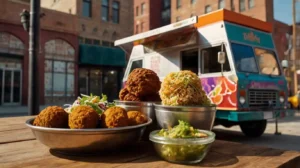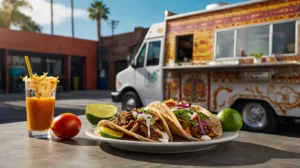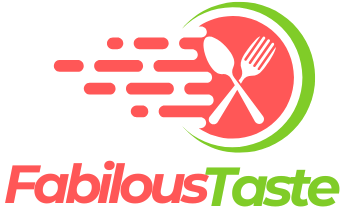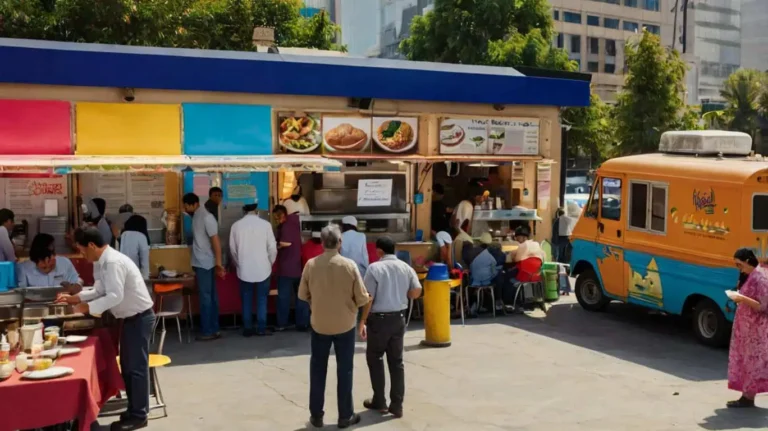Introduction: The Growing Popularity of Mobile Halal Kitchens
Halal food trucks have captivated food lovers by offering ethical, delicious, and inclusive meals. These mobile kitchens prepare dishes using halal standards, showcasing cultural diversity and richness. Moreover, their popularity continues to grow as they meet the demand for accessible and flavorful dining options.
In addition to being rooted in religious practices, halal food emphasizes cleanliness, ethical sourcing, and transparent preparation. These qualities attract not only those with dietary restrictions but also health-conscious eaters. For instance, recipes like Easy Gluten-Free Dinner Recipes for Family demonstrate how inclusive food choices can satisfy modern preferences.
Globally, halal food trucks are transforming urban food culture. They introduce vibrant fusion flavors to cities like New York and Jakarta, blending tradition with innovation. For example, exploring Versatile Egg Recipes for Every Meal showcases how culinary creativity drives customer appeal. Consequently, halal food trucks continue to adapt to diverse palates and preferences, further solidifying their global impact.
Tracing the Origins of Halal Food on Wheels
Halal food trucks began as simple operations in the late 20th century. Initially, immigrants established these trucks to provide affordable, halal meals to urban workers. Over time, they grew into essential elements of city life, showcasing both tradition and innovation.
For example, significant milestones include the introduction of fusion menus that combine halal practices with global cuisines like Mediterranean shawarma or South Asian biryani. Furthermore, dishes like those in Delicious Recipes Free No Cheese highlight how tradition inspires modern adaptations.
Today, halal food trucks actively promote cultural appreciation and inclusivity. By serving diverse communities, they strengthen their role as icons of ethical and accessible dining. Moreover, this evolution reflects the global shift toward sustainable and inclusive food options, making halal food trucks a lasting culinary trend.
Standards and Practices That Define Halal Cuisine
Halal food trucks adhere to strict guidelines to ensure their offerings meet halal standards. Certification plays a vital role in this process. Food trucks must obtain halal certification from recognized authorities, confirming that their ingredients and preparation methods align with Islamic dietary laws. For instance, this includes sourcing meat from animals slaughtered according to halal principles and avoiding any forbidden substances.
Preparation methods also follow rigorous standards. To maintain cleanliness and purity, food trucks use separate utensils and cooking spaces to prevent cross-contamination with non-halal items. Additionally, the cooking process excludes prohibited ingredients like alcohol, pork, or any byproducts derived from these.
Ingredients are another cornerstone of halal food trucks. They use ethically sourced and high-quality products to ensure their dishes remain halal-compliant. This meticulous attention to detail not only caters to religious needs but also appeals to health-conscious customers seeking clean and ethically prepared meals. For examples of ingredient creativity, explore dishes like those in Delicious Recipes Free No Cheese, which demonstrate how dietary guidelines can inspire innovative cooking.
Mouthwatering Dishes You’ll Find at These Food Trucks
Halal food trucks have earned their popularity by offering a diverse menu of mouthwatering dishes. Among the top-sellers is shawarma, a savory delight featuring marinated meat wrapped in flatbread and paired with tangy sauces and fresh vegetables. Its global appeal lies in its perfect balance of flavors and portability.
Another favorite is biryani, a fragrant rice dish often cooked with spiced chicken, lamb, or vegetables. Many trucks add unique twists, such as fusion flavors or customization options, to cater to diverse tastes. Similarly, falafel, a crunchy, protein-packed snack made from ground chickpeas, offers a vegetarian-friendly option that resonates with health-conscious eaters.
Halal food trucks are known for their innovation. From introducing fusion dishes like spicy tacos with halal meat to offering desserts like baklava, they cater to a wide range of customers. For more culinary inspiration, check out Versatile Egg Recipes for Every Meal, which highlights how simple ingredients can be transformed into creative dishes.
Why People Love Mobile Halal Dining Options
Tasty halal food trucks have gained widespread popularity thanks to their fusion flavors, affordability, and accessibility. These trucks offer a unique culinary experience by blending traditional halal recipes with global cuisines, resulting in innovative and mouthwatering dishes. For example, shawarma tacos, biryani burritos, or falafel burgers combine familiar tastes with exciting new twists. This fusion of flavors appeals to a broad audience, making halal food trucks a favorite among food enthusiasts.
Affordability is another significant factor driving their appeal. Halal food trucks provide high-quality meals at budget-friendly prices, making them accessible to students, workers, and families alike. Unlike brick-and-mortar restaurants, these mobile kitchens have lower overhead costs, allowing them to offer delicious meals without breaking the bank. This affordability ensures that more people can enjoy the benefits of halal cuisine without compromising on taste or quality.
Accessibility also plays a crucial role in their success. Positioned in bustling urban centers, college campuses, and popular event locations, halal food trucks bring flavorful and ethical dining options directly to customers. Many trucks also leverage technology, such as apps and social media, to inform customers about their locations and menu updates. This convenience makes halal food trucks a go-to choice for quick, satisfying meals on the move.
Ultimately, the combination of diverse flavors, affordability, and easy access ensures that halal food trucks continue to captivate food lovers. Their ability to adapt and innovate while staying true to halal principles further cements their place in the evolving street food scene. For similar inspirations, explore how accessible recipes like those in Versatile Egg Recipes for Every Meal can delight diverse audiences.
How to Track Down Halal Cuisine on the Go
Locating tasty halal food trucks has become easier with the help of modern technology and practical tips. Several apps and websites now specialize in listing halal food options, making it convenient for customers to find trucks that meet their dietary preferences. For instance, platforms like Zabihah and HalalTrip offer user-friendly interfaces to search for halal-certified food trucks nearby. These tools often include reviews, menus, and real-time location updates to ensure a hassle-free experience.
Social media platforms like Instagram and Twitter also play a crucial role in finding halal food trucks. Many trucks actively post their schedules, new menu items, and special deals, allowing followers to stay updated. Additionally, using hashtags such as #HalalFoodTruck or #HalalEats can help discover local options.
For those exploring new areas, word-of-mouth recommendations and community groups can also provide valuable insights. Joining local food forums or engaging with halal food communities often leads to hidden gems. By combining these resources, finding tasty halal food trucks becomes a seamless and enjoyable process.
Health Perks of Choosing Halal Meals

Halal food stands out not only for its ethical standards but also for its health benefits. The nutritional value of halal-certified dishes stems from the emphasis on fresh, high-quality ingredients. For example, halal meats are sourced from animals treated humanely and slaughtered in a way that minimizes stress, resulting in better-quality meat.
Cleanliness standards are another hallmark of halal food. From preparation to serving, halal kitchens maintain strict hygiene practices, ensuring a safer dining experience. These standards align with the principles of ethical sourcing, which prioritize sustainability and animal welfare. Such practices appeal to health-conscious individuals seeking nutritious and responsibly prepared meals.
In addition to being free from prohibited ingredients like alcohol and pork, halal food often includes healthier alternatives. Many dishes incorporate spices, lean proteins, and whole grains, enhancing both flavor and nutritional value. This combination of ethical practices and health-conscious preparation ensures that halal food not only satisfies the palate but also supports overall well-being.
Steps to Launch a Successful Halal Food Truck
Starting a halal food truck requires careful planning and adherence to specific guidelines to ensure success. The process begins with obtaining the necessary licensing and permits, which vary by location. Entrepreneurs must ensure that their business complies with local health, safety, and zoning regulations. Additionally, halal certification is essential to assure customers that all ingredients and preparation methods meet halal standards.
Investing in the right equipment is another critical step. A fully equipped food truck typically includes a grill, fryer, refrigeration units, and storage space for ingredients. Selecting reliable and efficient equipment minimizes downtime and ensures the smooth operation of the business. Entrepreneurs should also prioritize a clean and organized workspace to maintain hygiene and efficiency.
Menu planning is key to attracting a diverse customer base. While staples like shawarma, biryani, and falafel are popular, adding unique fusion dishes or regional specialties can set a truck apart. Offering customizable options, such as vegan or gluten-free meals, broadens the appeal to a wider audience.
Finally, effective marketing strategies play a crucial role in building a loyal customer base. Social media platforms like Instagram and Facebook are excellent tools for showcasing dishes, announcing locations, and engaging with customers. Additionally, participating in local events, food truck festivals, or partnering with delivery apps can significantly boost visibility. Entrepreneurs should also encourage customer reviews and feedback to build trust and credibility.
Inspirational Journeys of Food Truck Entrepreneurs

Several halal food trucks have achieved remarkable success by combining culinary excellence with strong branding. For example, The Halal Guys, which started as a modest cart in New York City, has grown into an international brand. Their journey showcases the power of consistency and customer-focused service. By offering high-quality dishes like chicken and gyro platters with signature sauces, they built a loyal following that propelled their expansion.
Another inspiring example is Halal Cart DC, a Washington-based food truck known for its creative fusion dishes. Their menu includes items like tikka masala fries and halal tacos, which blend traditional and modern flavors. Their success stems from innovative menu offerings and a strong online presence that resonates with a diverse audience.
These stories demonstrate that success in the halal food truck industry comes from understanding customer preferences, maintaining high standards, and embracing creativity. For more culinary ideas and inspiration, you can explore innovative options like those in Versatile Egg Recipes for Every Meal, showcasing how simple ingredients can be transformed into standout dishes.
Challenges That Come with Running a Halal Food Truck
Running a halal food truck comes with unique challenges that owners must navigate to succeed. One major hurdle is competition. Food trucks operate in a highly competitive market, often contending with other halal trucks and general street food vendors. To stand out, owners must consistently offer high-quality food, innovative menus, and excellent customer service.
Compliance is another critical challenge. Halal certification requires adhering to strict guidelines, including sourcing halal ingredients and maintaining proper preparation standards. In addition, food truck operators must comply with local health and safety regulations, which can vary widely by region. Failing to meet these standards can result in fines or the loss of operating licenses.
Operational hurdles, such as maintaining equipment, managing supply chains, and dealing with unpredictable weather, can also impact day-to-day business. Food truck owners often work long hours to ensure smooth operations, which can lead to burnout. However, adopting efficient practices, such as using reliable equipment and establishing strong supplier relationships, can help mitigate these issues.
Bringing Cultures Together Through Food

Halal food trucks play a vital role in promoting diversity and fostering cultural appreciation. By serving halal cuisine, these trucks introduce customers to flavors and traditions from around the world, such as Middle Eastern shawarma, South Asian biryani, or Mediterranean falafel. This exposure helps bridge cultural gaps and encourages a deeper understanding of different communities.
Moreover, halal food trucks actively contribute to breaking stereotypes. They demonstrate that halal food is not limited to a specific audience but can be enjoyed by everyone. The growing popularity of fusion dishes, like halal tacos or biryani bowls, highlights how traditional flavors can seamlessly blend with modern culinary trends.
Beyond food, these trucks help build a sense of community. Many halal food trucks serve as gathering places where people from diverse backgrounds can connect over a shared love of food. By participating in local events and festivals, they foster inclusivity and strengthen communal bonds. This cultural impact underscores the importance of halal food trucks in today’s multicultural society, making them symbols of unity and understanding.
Sustainability Practices in Food Truck Operations
Eco-friendly practices are becoming essential in the food truck industry, and halal food trucks are no exception. One of the primary ways they embrace sustainability is through sustainable packaging. Many trucks have replaced single-use plastics with biodegradable or compostable options, such as paper-based containers or reusable utensils. These choices not only reduce waste but also appeal to environmentally conscious customers.
Another critical practice is waste reduction. Halal food trucks often focus on minimizing food waste by carefully planning portions and repurposing leftover ingredients when appropriate. Additionally, partnering with local food banks or donation programs helps ensure surplus food is distributed to those in need, rather than discarded.
Energy-efficient operations also play a key role in reducing environmental impact. Trucks equipped with energy-saving appliances, such as low-power grills and LED lighting, consume less fuel. Some even explore renewable energy sources, like solar panels, to power their operations. These initiatives not only lower emissions but also cut costs in the long run, making eco-friendly practices a win-win for both the environment and business.
What Lies Ahead for Halal Food Trucks
The halal food truck industry is poised for significant growth, driven by emerging trends and advancements in technology. One major trend is the rise of fusion cuisine, which continues to attract a diverse customer base. Combining halal principles with popular global flavors, such as sushi burritos or kimchi shawarma, keeps menus fresh and exciting, ensuring sustained customer interest.
Tech integration is also shaping the future of halal food trucks. Mobile apps, GPS tracking, and digital payment systems enhance customer convenience by making it easier to locate trucks and place orders. Some trucks are even adopting AI-driven tools to predict customer preferences, optimize menus, and streamline operations.
As the demand for halal options grows, the industry is set to experience significant market expansion. New regions are embracing halal food trucks, and established operators are scaling their businesses by opening multiple locations or franchising. Moreover, an increased focus on sustainability and dietary inclusivity positions halal food trucks as key players in the broader food industry.
Overall, the future of halal food trucks looks bright, marked by innovation, inclusivity, and global growth. These trucks will not only continue to satisfy cravings but also set standards for ethical and sustainable dining in the modern world.
FAQs: Answers to Common Questions About Tasty Halal Food Trucks
1. What is a halal food truck?
A halal food truck serves meals prepared in accordance with Islamic dietary laws. This includes using halal-certified ingredients, avoiding prohibited substances like pork or alcohol, and maintaining strict hygiene standards.
2. How do I know if a food truck is halal-certified?
Most halal food trucks prominently display their halal certification on menus or the truck itself. You can also ask the staff about their certification or sourcing practices.
3. What types of dishes do halal food trucks serve?
Halal food trucks offer a diverse range of dishes, from traditional options like shawarma and biryani to fusion creations such as halal tacos or falafel burgers. Many trucks also cater to vegetarian and vegan diets.
4. Are halal food trucks more expensive than regular food trucks?
Not necessarily. Halal food trucks often maintain competitive pricing while providing high-quality, ethically sourced meals. The cost typically reflects the quality of ingredients and the care taken in preparation.
5. Where can I find halal food trucks?
Halal food trucks are commonly found in urban areas, near college campuses, and at food festivals. Apps like Zabihah or social media platforms can help you locate them easily.
Conclusion: The Role and Potential of Halal Food Trucks in Modern Cuisine
Halal food trucks have become a significant part of the global street food scene, blending cultural traditions with contemporary dining trends. They offer an inclusive and ethical dining option, attracting a diverse customer base while adhering to high standards of quality and preparation. Through their innovative menus and accessible pricing, halal food trucks provide not just meals but also a platform for promoting diversity and breaking cultural stereotypes.
Looking ahead, halal food trucks are poised to play an even greater role in modern cuisine. With their embrace of eco-friendly practices, technological advancements, and creative fusion dishes, they are setting new benchmarks in the food industry. Their ability to adapt to evolving tastes and values ensures they will remain a beloved and influential part of the culinary world for years to come.

